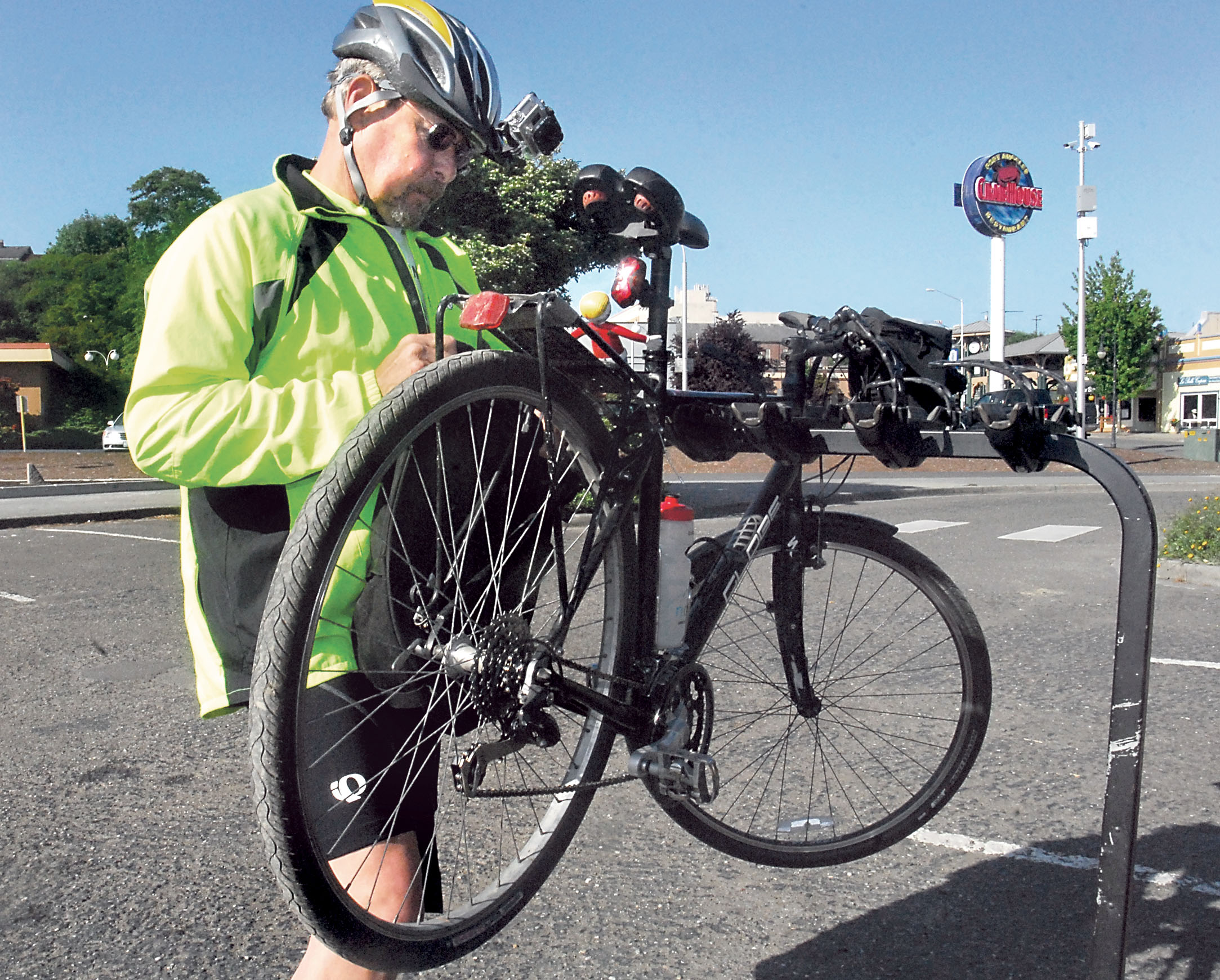PORT ANGELES — A Port Angeles man plans to leave today to drive and bicycle to every county in Washington state to tell the story of his 34-year-old son who died a year ago June 7 of injuries sustained in a struggle with Spokane County sheriff’s deputies.
His goal is to survey law enforcement agencies’ readiness in crisis-intervention techniques and gather support for state legislation that would mandate at least 40 hours of crisis-intervention training for law enforcement officers across the state.
“It just has to get worked into the curriculum,” Bill Berger said Friday.
This legislation had been introduced last year, Berger said, but stalled in committee after the 40-hour requirement was reduced to 12 hours and other changes were made that Berger thought “watered down” the bill.
Such training, Berger believes, might have saved his son’s life a year ago.
On June 6, 2013, son Will Berger, a Port Angeles High School and Peninsula College graduate, was involved in a struggle with Spokane County deputies in a parking lot across the street from a gym where he had just completed a workout, his father said.
After deputies were called to the gym by a report of a disturbance involving Will Berger, they shot him with a stun gun five times and placed him in a neck hold intended to restrict blood flow to his head, according to The Spokesman-Review of Spokane and Sheriff’s Office accounts.
He was taken by ambulance to Providence Sacred Heart Medical Center in Spokane, where he died the next morning.
Bill Berger said the descriptions of his son’s actions leading up to his encounter with deputies fit with manic episodes he had had occasionally since he was 15.
Berger described these episodes as times when his son would not eat or sleep and could be agitated.
Will Berger’s death was described as a homicide, according to his death certificate, with contributing factors listed as oxygen depravation and “application of restraint measures.”
The Spokane County Prosecuting Attorney’s Office continues to review the case, according to The Spokesman-Review.
A Spokane Sheriff’s Office spokesman referred comment to a sergeant responsible for investigations into allegations of employee misconduct, who was not available Friday.
On the day of the altercation, Berger said his son had signed papers to close on a home he had bought in Spokane and had toured it with his father.
“He was a responsible, sensitive person,” Berger said of his son.
On Monday, Berger plans to be in Shelton in Mason County, where he’ll ride his bike about 25 miles on local trails and hand out information about crisis-intervention training at City Hall.
Berger said he’ll also gather signatures of support for legislation to make such training mandatory for law enforcement agencies across the state.
From there, he plans to drive south and do the same in the state’s southwest counties, eventually arriving back in Port Angeles by Friday.
Then he plans a Fourth of July ride, leaving City Pier at 8:30 a.m. to bicycle to 7 Cedars Casino in Blyn to gather more signatures.
Berger had addressed Port Angeles City Council members on this topic at their June 3 meeting and distributed information on crisis-intervention training.
Berger said he hopes to visit most of the state’s counties by July 20 and get to the remainder in September.
More information on his trip and how to make a donation can be found at www.willbfund.org.
Berger said he was impressed with Port Angeles police encounters with his son when he had had manic episodes in December 2006 and January 2007.
“Port Angeles police were outstanding,” Berger said.
Deputy Chief Brian Smith said officers have received crisis-intervention training for the past 10 years.
At least some officers on every shift have received 40 hours of crisis-intervention training through a training course in 2009, Smith said.
Department officials hope to bring another such course to the city in 2015, Smith said.
“We are comfortable with the number of [crisis-intervention-trained] officers we have but would like to have more,” he said.
Clallam County Sheriff Bill Benedict said that between six and seven deputies, detectives and sergeants have had 40 hours of crisis-intervention training.
The Sheriff’s Office also has policies in place that require deputies who encounter people with apparent mental illness to take them to Peninsula Behavioral Health or Olympic Medical Center.
Sgt. David Campbell of the Sequim Police Department said all officers get at least eight hours of training annually in how to work with people who appear to be suffering from mental illness.
This involves both written and live-action training in which an officer is asked the correct response to given scenarios.
“[The scenarios are] based on real-life incidents that have actually occurred throughout the country,” Campbell said.
Forks Police Department Administrator Rick Bart said officers receive eight hours of training annually.
“The problem is recognizing that you’ve got that kind of an issue when it happens,” he said. “Depending on the situation, you may not have time to figure that out.”
Patrick Fudally, public information officer for the Port Townsend Police Department, said he personally has received about 100 hours of crisis-intervention training over the past two years.
He said he also has developed written training materials for officers based on a widely used textbook designed to teach crisis-intervention training to police departments.
“Everyone one has a good foundation from the book,” Fudally said.
Both Port Townsend officers and Jefferson County sheriff’s deputies also attended classes on this training over the course of three days earlier this year in Port Townsend, he said.
Jefferson County Sheriff Tony Hernandez said deputies have participated in this training, which also includes work on handling domestic violence situations, every year since 2012.
“I’d say we’re pretty close to having all our guys trained,” Hernandez said.
________
Reporter Jeremy Schwartz can be reached at 360-452-2345, ext. 5074, or at jschwartz@peninsuladailynews.com.

